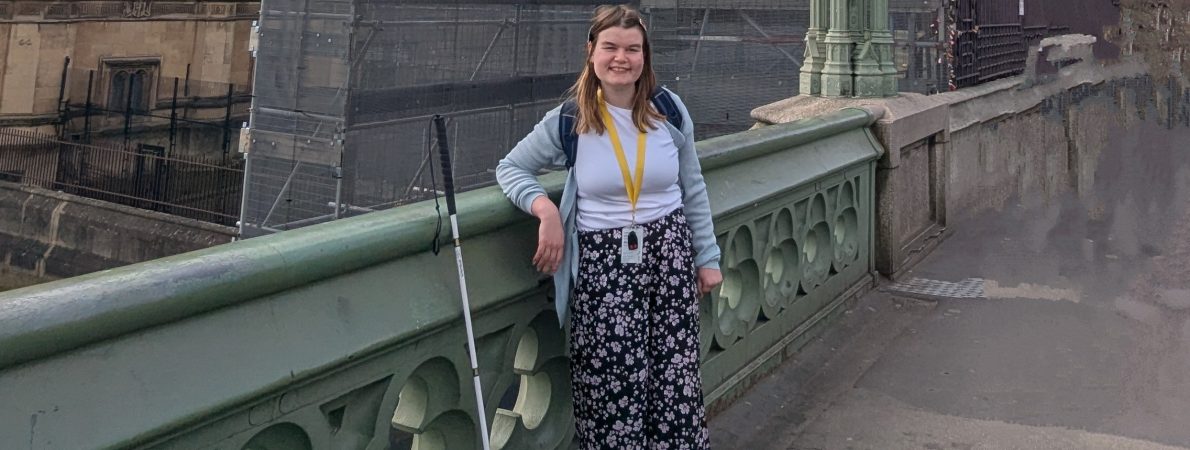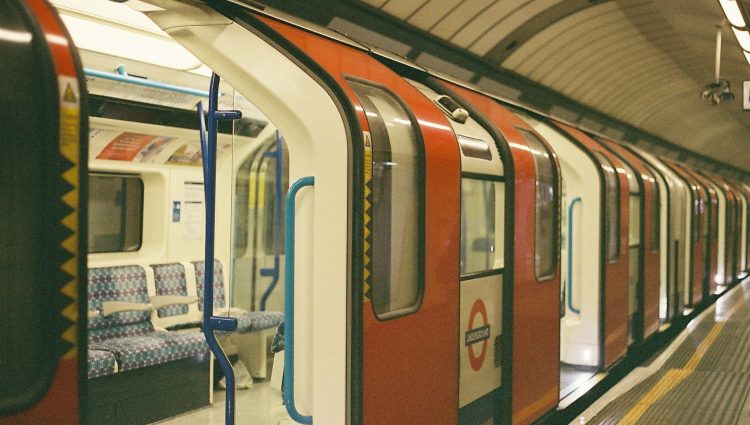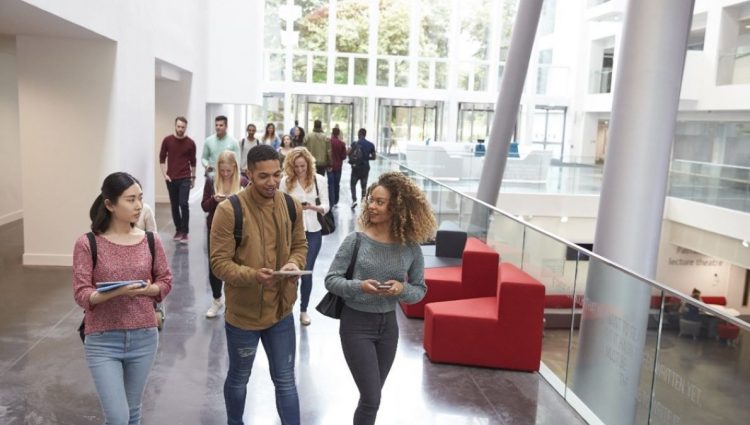On Tuesday 11th March 2025 Sarah Cobb, one of TPT’s Student Voice volunteers, attended parliament to give evidence to the Education Select Committee’s Solving the SEND Crisis inquiry. Sarah was one of five young people invited to attend the public hearing to share their personal experience of education. We were very proud of Sarah for her contributions to the work of the committee. Having the experiences of blind and partially sighted students represented at this forum will help to ensure that these experiences are not overlooked in the committee’s recommendations to the Department for Education.
Sarah tells us about what this experience was like for her…
Self-advocacy: Giving oral evidence to the Education Select Committee, to support the inquiry into Solving the SEND Crisis, by Sarah Cobb
I check my rucksack one last time. Phone, keys, medication, cane. Good. I have everything.
I hesitate before putting my water bottle in my bag, knowing full well I was likely to get it confiscated. I put it in anyway, swing my rucksack onto my back and immediately wince at the pain that subsequently shoots up my upper right arm. Glancing around my room one final time, I attempt to unfold my cane without touching my fresh wounds and leave my flat.
I’d fallen over some uneven terrain yesterday, and my hands and left cheek were covered in cuts and scrapes, the worst ones concealed by plasters.
I’m nearly 45 minutes early by the time I arrive at the station. Upon reaching the Passenger Assistance desk, a uniformed staff member accompanies me to a waiting room further down the platform, assuring me someone will come back to help me find a seat on the train when the time comes for its departure. I observe indistinct figures hurrying in both directions and listen as the automated announcements echo through the waiting room.
The train arrives early, and I stand up expectantly. No one comes and I wait, my heart thudding, as the train doors close and the whistle blows. It’s like the train’s about to leave. But it’s not time yet.
Finally, someone comes and helps me find me a seat in the accessible carriage, before rushing off the train as it gives a jolt and moves steadily down the train tracks.
I’m facing the wrong way. I’m starting to feel sick. I lean back and close my eyes as the train rumbles through various tunnels and wait for the train to arrive in St Pancras.
Finally, the train pulls into the station. It’s right on time: 9:29 on the dot. Lucy, the staff member from TPT who is coming to support me, is waiting on the platform when I arrive. She takes my arm and guides me through the crowded station, surging our way through the hazy sea of faces.
I’d known it was going to be busy, of course I did. But I hadn’t anticipated it being quite so busy, especially not this early in the morning. Already unsteady on my feet and uncertain of the unfamiliar environment, I hang tightly onto Lucy’s arm as we walk towards the station’s exit.
“Don’t worry, we’ve got our fast-track letters.” Lucy whispers to me when we arrive at Parliament a short while later. We walk confidently towards the front of the seemingly never-ending queue, showing our letters to a uniformed security guard.
We then reach Security. It’s like being at an airport. I put my belongings in the screening tray in front of me, including my cane and water bottle, and it moves off down the conveyor belt.
I feel lost and agitated without my cane, especially when we get to the next stage of the Security check-in: the magnetic scanner. “I’m really sorry, but I can’t go through the magnetic scanner – unless someone wants to take me to A&E!” I try to make a joke of it, but I feel my face reddening at having to explain about my medical condition stopping me from going through the scanner. The security guard lets me through and the tray containing my belongings appears a few moments later, when Lucy also arrives at my side. That’s the end of the Security check-in, thank goodness. We reach the main entrance to Portcullis House.
“Is there step-free access to the Wilson room? Sarah’s unable to use stairs…” I marvel at the magnificent building, as we follow someone down an accessible route to the Wilson room.
The corridors are long and narrow as we walk through the building towards the Wilson room. The staff member stops outside an official-looking room and checks their watch. It’s 10:35. “We’re a bit early, so do you want to come next door and meet the other young people?” Lucy and I follow the staff member into a nearby room, and I’m greeted by a large circular table, where several strangers are sitting, chatting to the people around them.
Lucy guides me to a chair next to a girl around my age, with short blonde curly hair. We introduce ourselves and spend the next twenty minutes chatting, our conversation flowing so easily that it feels like we’ve known each other forever.
Suddenly, it’s time. We all head into the Wilson room and sit in the public gallery at the back, as we wait for the previous session to finish. Thankfully, we don’t have to wait long. I can feel the nerves bubbling up inside me.
Lucy helps me to a chair at the near end of the circular table, where a lot of other people are already seated. “They must be the MPs.” I think to myself, as I fold my cane up and put it under the table. “I’m sorry, Sarah, I have to wait in the public gallery,” Lucy whispers to me. “Good luck!”
She squeezes my shoulder and leaves, heading back towards the public gallery.
“I would like to welcome our witnesses to the Education Select Committee, for the second half of our evidence session for our inquiry into solving the SEND Crisis. Each of our witnesses is a young person who has direct [either current or recent] experience of the SEND system.”
I feel my heart rate quicken as I wait for my turn to answer the first question. So I take a sip of the water in front of me to calm myself.
Talking about my experience of the SEND system, it was a relief to finally get it out there about what it was really like. All of the MPs seemed really interested in what we had to say and were very understanding of my needs: always saying their names before speaking and repeating a question as many times as I needed it.
The evidence session passes surprisingly quickly, and my nerves ease as the session progresses. Despite the ongoing isolation I felt at being the only physically disabled witness and the only one who hadn’t prepared any notes, I felt at ease and was able to speak freely about the toll my experiences of the SEND system had had on my mental health.
All too soon, the evidence session is over, and Lucy comes over to greet me, congratulating me on speaking so clearly about my experience. Together, we thank the organiser, who presses a booklet and a signed envelope into my hand.
Upon arriving back at King’s Cross in plenty of time for my 14:12 train, Lucy helps me to buy a sandwich, and we head over to the Passenger Assistance desk together. It’s at this point that Lucy bids me farewell and promises she’ll be in touch soon. She gives me a final wave and is gone.
My train arrives early. Someone from Passenger Assistance comes and helps me onto the train, assuring me they will radio ahead to Cambridge. My train’s due to leave at 14:12. I hope it leaves on time, as I have a class at 4pm, and I’d really like to be there for the start.
The train leaves at 14:12 exactly. I spend the journey staring blankly out the window as the train trundles towards Cambridge. Before I know it, we’ve arrived in Cambridge. It slows to a stop, and I wait expectantly for someone to help me off the train. But no one comes.
I tentatively approach another passenger and ask them to help me off the train and onto the platform. I walk slowly along the platform, using the tactile paving to help me navigate my way. But it isn’t until I’m nearing the entrance to the station that someone finally comes.
“I think Passenger Assist at King’s Cross might’ve accidentally put you in the first-class carriage, instead of the accessible one.” I breathe an inward sigh of relief at their words. At least they hadn’t forgotten me; it had all been a misunderstanding.
There hadn’t been any Wi-Fi on the train, so I wasn’t able to book my taxi to go back to uni in advance. I wait until I’m safely inside the station, before I book it. I’m only waiting for a couple of minutes before I’m notified my taxi’s here. I cautiously approach a couple of people wearing bright orange jackets, who accompany me to my taxi, ensuring I’m safely in the right one before they leave. And then I’m back at uni and the day is over.
Self-advocating as a severely sight impaired young adult is something that is very important to me, and I feel honoured and privileged to have been given the opportunity to advocate for myself and other visually impaired young adults by going to the Houses of Parliament and giving oral evidence for the inquiry into solving the SEND Crisis.
You can read more about the inquiry and watch back on the committee here: 11 March 2025 – Solving the SEND Crisis – Oral evidence – Committees – UK Parliament
Please visit Sarah’s website if you would like to read more about her experiences: Events – Sarah Cobb – Writer and Disability Activist







